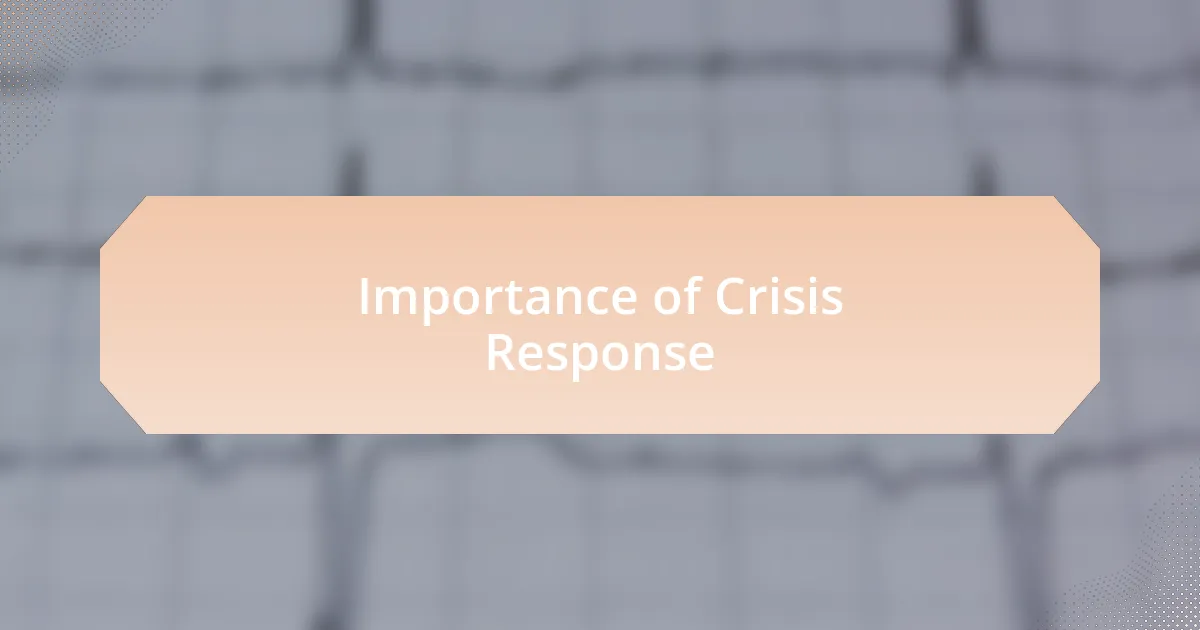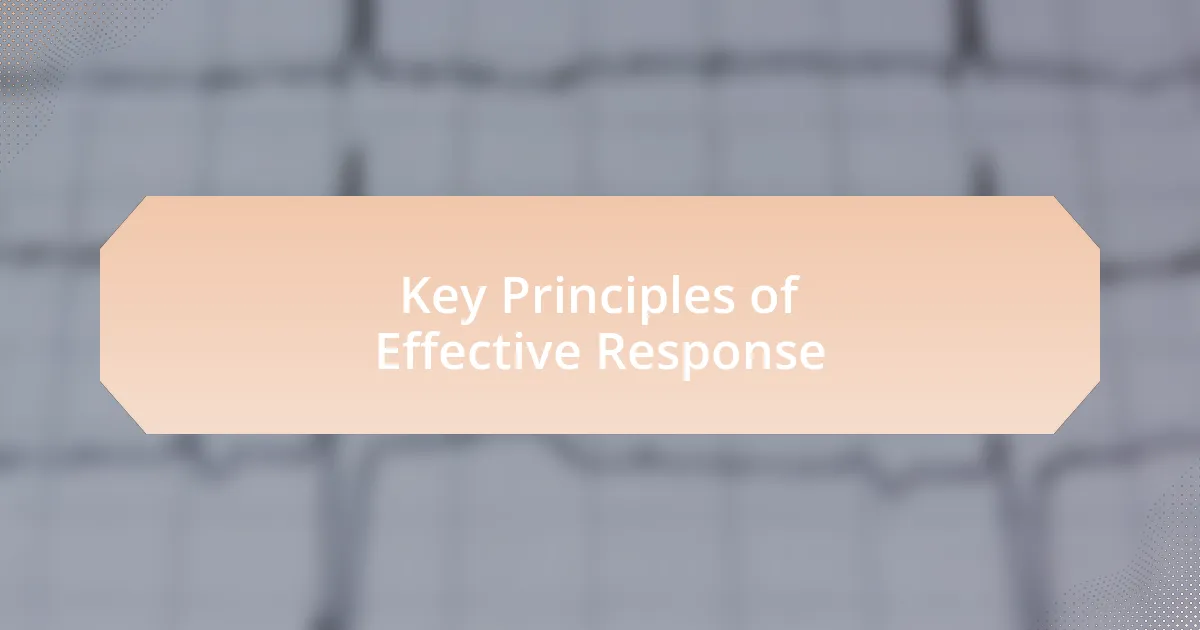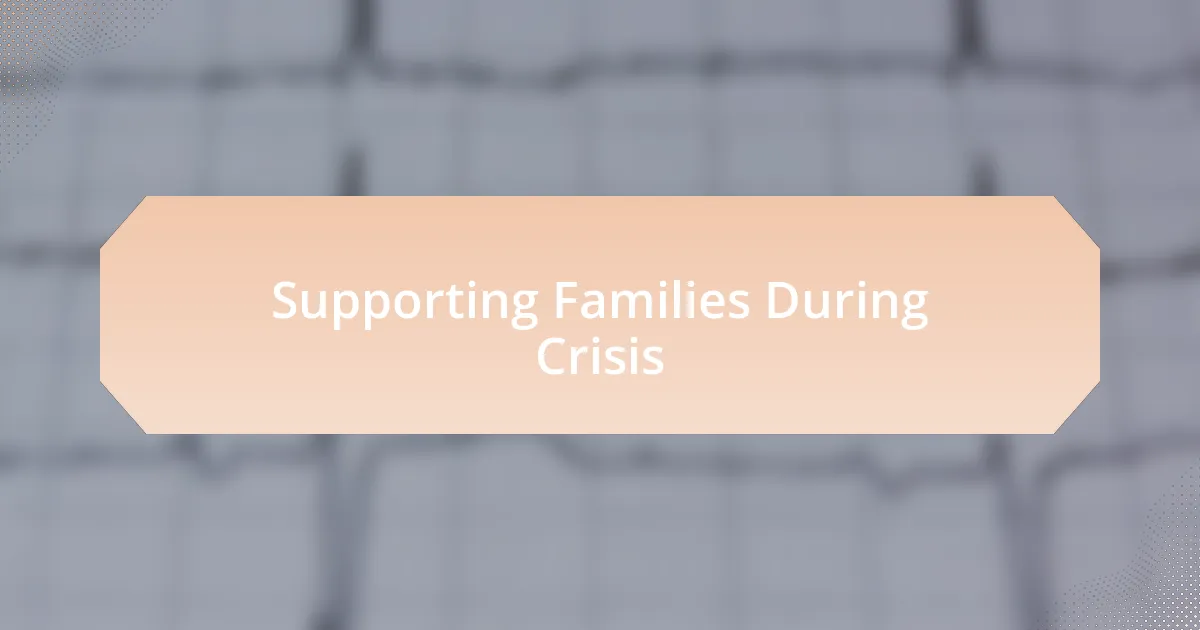Key takeaways:
- Hospital ministry focuses on holistic care, addressing patients’ physical, emotional, and spiritual needs.
- Effective crisis response is essential, emphasizing active listening, clear communication, and fostering a sense of community.
- Building meaningful relationships with patients involves intentionality, vulnerability, and genuine interest in their stories.
- Self-care for ministry professionals is critical to maintain emotional resilience and effectiveness in supporting others.

Understanding Hospital Ministry
Hospital ministry is a unique blend of healthcare and spiritual care, where chaplains and ministers offer support to patients and their families during some of life’s most challenging moments. I recall a time when I sat with a mother who had just received devastating news about her child’s condition. The look of despair in her eyes was profound. In that moment, I realized that simply being present and listening can be a balm for the soul.
What’s fascinating about this ministry is its focus on holistic care—addressing not only the physical needs of patients but also their emotional and spiritual well-being. I often ask myself, how can my healing presence contribute to a person’s journey toward peace? Each patient brings a story filled with hope and fear, and it’s in those quiet conversations that faith often shines brightest.
The role of hospital ministry goes beyond traditional roles; it’s about building connections amidst uncertainty. I’ve found that a simple prayer or a moment of silence can create a powerful space for reflection. It’s intriguing to think about how these sacred moments can transform both the caregivers and patients, inviting a sense of community even in the most isolating circumstances.

Importance of Crisis Response
Crisis response is crucial in hospital ministry, as it directly impacts the well-being of patients and their families. I remember one evening spent with a father grappling with the uncertainty of his son’s surgery. The air was thick with tension, and I felt compelled to respond quickly—offering reassurance through compassionate listening and empathetic dialogue. This taught me that how we respond in times of crisis can shape the emotional landscape for those in our care.
In times of crisis, effective response not only alleviates immediate fears but can also foster resilience. I’ve observed firsthand how a thoughtful intervention, like guiding a family through challenging decisions or providing a quiet space for prayer, can sow the seeds of strength. It always makes me wonder: how much can our support during these critical moments influence the healing journey ahead?
Moreover, a well-thought-out crisis response can serve as a guiding light for families lost in darkness. A few months ago, I found myself beside a grieving widow who felt utterly alone in her sorrow. Together, we listened to the echoes of her husband’s laughter, and in that exchange, I realized that connecting through shared pain often helps others feel less isolated. What I’ve learned is that an intentional response can transform a moment of despair into an opportunity for hope and support.

Key Principles of Effective Response
Effective crisis response hinges on the ability to actively listen and assess immediate needs. I recall a time when a mother arrived at the hospital, trembling in distress regarding her child’s sudden illness. By simply sitting with her and asking what she needed most in that moment—whether it was information, comfort, or perhaps even silence—I was able to provide a tailored response that immediately eased her tension.
Another guiding principle is the importance of clear communication. There was an instance when I had to convey not-so-great news to a family. Instead of shying away from difficult conversations, I opted for transparency, pairing my words with genuine compassion. This approach not only helped them grasp the gravity of the situation but also forged a deep trust that ultimately allowed us to navigate the next steps together. Have you ever considered how crucial it is to strike the right balance between honesty and hope during such times?
Lastly, fostering a sense of community can be a cornerstone of effective crisis response. I witnessed the power of this when a faith group rallied around a family facing an unexpected medical crisis. Their presence, prayer, and emotional support made a world of difference. In such moments, I often reflect on how meaningful it is for individuals to know they are surrounded by a network of care. Isn’t that sense of belonging essential for healing, especially when one feels utterly vulnerable?

My Personal Approach to Ministry
My approach to ministry is rooted in authenticity and empathy. I often find that the simplest gestures can have the largest impact. For instance, there was a day when I noticed a weary father in the waiting area, shoulders slumped in despair. I took a moment to share a warm smile and ask how he was holding up. That small connection opened the door for him to express his fears and ultimately feel less isolated in his struggle.
In my experience, being present means more than just physically showing up; it’s about being there emotionally as well. I remember comforting a dear friend whose loved one was in critical condition. Instead of trying to fill the silence with words, I chose to simply sit with her, allowing her to process her emotions. That unspoken bond often speaks louder than any conversation, emphasizing the importance of shared silence during turbulent times. Have you ever noticed how powerful it can be just to offer your presence without the pressure to perform?
I’ve also learned that adaptability is key. Each person responds differently to crisis, and I make it a priority to recognize individual needs. On one occasion, a patient wanted to discuss her spiritual beliefs while receiving treatment. I adjusted our time together to focus on her questions, which turned out to be a healing experience for both of us. How can we better accommodate these unique journeys in ministry? It’s something I continually explore, seeking ways to serve with flexibility and understanding.

Building Relationships with Patients
Building meaningful relationships with patients requires intentionality and openness. I recall a time when I met a young woman who was experiencing severe anxiety before her surgery. Rather than just reciting facts about the procedure, I took the time to ask her about her interests and what she loved to do. Finding common ground in our love for art not only eased her tension but allowed us to connect on a deeper level, forging trust and creating space for her to share her fears.
I often think about how crucial it is to be genuinely interested in each patient’s story. One afternoon, I spent extra time with an elderly gentleman who repeatedly mentioned missing his backyard garden. Instead of just providing comfort, I asked questions that prompted memories and feelings associated with his garden. As he spoke about the bright flowers and the peace he found in tending to them, it became clear how vital that connection was for him, allowing him to find calm amidst the chaos of illness. Isn’t it fascinating how our shared stories can bridge gaps and heal?
In my experience, vulnerability plays a significant role in building rapport. I remember meeting a patient who was hesitant to open up, his walls clearly built from past disappointments. I chose to share a personal struggle of my own—something not easy to do. It caught him off guard and allowed him to see me as more than just a caretaker. It initiated a heartfelt dialogue that eventually made him feel safe enough to express his own concerns. Have you seen how organic these interactions can be when we allow ourselves to be a little vulnerable?

Supporting Families During Crisis
Supporting families during a crisis requires not just empathy, but a proactive approach. I recall a time when a family member was stressed about a loved one’s severe health condition. I decided to organize a small meeting room where the family could gather, discuss their emotions openly, and even share a meal. This simple act transformed the atmosphere, creating a space where they felt safe to express their worries and support one another.
During another situation, I worked with a family whose patience was wearing thin as they waited for news about a surgery. Instead of just offering generic reassurances, I encouraged them to engage in activities together, like sharing stories about their favorite family moments. Watching them laugh and cry together not only brought them closer but also gave them a much-needed respite from the intensity of their circumstances. Have you ever noticed how shared experiences can weave a stronger family bond during the toughest times?
It’s fascinating how the emotional needs of families often go unaddressed in crisis situations. I’ve seen caregivers short on time fail to acknowledge the overwhelming grief that families experience, leaving them feeling isolated. When I took a moment to sit with one family, asking how they were truly holding up, it opened up an important conversation about loss and fear. It became clear to me that nurturing the emotional well-being of families during crises is just as crucial as caring for the patient themselves.

Self-Care for Ministry Professionals
Self-care is essential for ministry professionals, especially when facing the emotional toll of crisis response. I remember a particularly taxing week when I found myself drained after multiple hospital visits. To recharge, I carved out small pockets of time for myself—whether it was taking a quiet walk or finding a few minutes to read. Those moments were critical; they reminded me that I needed to nurture my own spirit to effectively support others.
Beyond just personal time, I’ve found that connecting with fellow ministry workers can be incredibly rejuvenating. I once participated in a support group where we shared our struggles and triumphs. This exchange not only provided comfort but also sparked ideas that I could implement in my ministry. Have you ever considered the power of community and shared experiences in your own journey?
It’s not uncommon to overlook self-care in the hustle of providing support to others. For example, during a particularly emotionally charged crisis, I forgot to check in with myself, leading to burnout. I learned the hard way that incorporating rituals—like brief daily meditations or journaling—can ground me. These practices help me reflect on my experiences while offering a manageable outlet for the stresses that accompany this vital work. How do you find balance in your ministry practice?